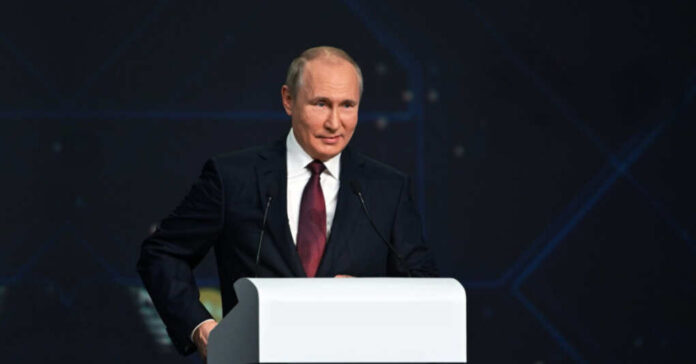
Over the past three years, more Russians seem to trust their country’s election process, which could boost Vladimir Putin’s reelection prospects heading into the 2024 presidential election. A Russian Public Opinion Research Center survey found that confidence in election results increased from 46% in November 2020 to 61% in 2023. At the same time, the number of people who don’t trust the elections dropped from 50% to 33%.
But what the polls say and what they mean are two different things.
Aleksei Miniailo, Russian opposition politician and founder of the Russian research group Chronicles, explained that the news is far from reassuring. Russians are confident that their election outcomes are predetermined, but they have no confidence in how they are conducted or their vote’s ability to change those results. Russia’s voting system ensures that Incumbents, like Putin, remain in power until they die.
Russia has a history of election manipulation, including forced voting and ballot stuffing. Russia’s electoral commission dismissed these accusations. Throughout Putin’s presidency, his most prominent critics were barred from running, and candidates from opposition parties have faced persecution.
Political opposition leader Alexei Navalny, a vocal critic of the Russian president, understands political persecution all too well. In 2020, Navalny sought medical attention in Germany after being poisoned with a nerve agent. On his return to Moscow, he was sentenced to 19 years in jail for openly opposing Putin.
The state-run sociological institution VCIOM, known for its alliance with the Kremlin, conducted its own research VCIOM “revealed” that 70% of respondents expressed confidence in the integrity of Russian elections. The study appears to be a government-driven effort to prepare for the upcoming election in March 2024, with Putin expected to run for reelection. Amendments to the Russian constitution have allowed him the potential to remain in office until 2036.
When asked about Putin’s intentions to run for office again, Kremlin press secretary Dmitry Peskov stated last month that the president “has no competitors and cannot have any in Russia.” Preskov notes that Putin would be reelected with “more than 90% of the vote.”
The Kremlin has assembled a group of figures for a PR event to name and endorse Putin. This eclectic group includes a nationalistic singer named Shaman, the first Russian woman in space, 86-year-old Valentina Tereshkova, and the 78-year-old film director Nikita Mikhalkov.
Potential candidates for the expected carefully orchestrated election include Gennady Zyuganov, a longtime leader of the Communist Party at 79, and Leonid Slutsky, the 55-year-old leader of the nationalist Liberal Democratic Party.
Russian elections appear to be an “acclamation” and a test of whether the state system, including electoral manipulations, is accepted by citizens. Miniailo noted that no “dangerous” independent candidates are permitted to run against Putin, who has established a system where his administration controls election participants. Because the court systems are under his influence, it’s impossible to fight for court eligibility.
On Tuesday, Putin signed a law allowing the election to be held under martial law conditions in partially occupied regions of Ukraine.
Putin has broadened censorship and crackdowns on media freedoms since his 2022 invasion of Ukraine, making it challenging to assess Russia’s true feelings about the upcoming election. In addition, Putin’s advisors carefully hand-pick what media organizations and reporters are permitted access to him.
According to Kremlin-sponsored information, the likelihood of 71-year-old Putin securing another six-year term, extending his presidency until 2030 and potentially beyond, is inevitable.
Putin’s “approval ratings” typically range from 79% to 83%, and over his nearly 24 years in power as president and prime minister, his support seldom dropped below 60%. That’s because, in Russia, fear equals respect. Amidst an ongoing conflict with Ukraine, dependencies on China, and a prolonged confrontation with the United States and the West, Russians seem to prefer Putin’s authoritarian approach.
Besides, Putin has stacked the deck to ensure no alternative candidate matches his widespread name recognition.
From massive government censorship of the opposition to persecution of an opponent through manufactured legal issues, President Joe Biden’s reelection campaign seems to be right on track for a 2024 victory.
The Biden administration is urging his campaign to quash any potential third-party challengers, and lingering concerns about “voting irregularities” in his 2020 election victory contribute to continued skepticism about the upcoming election results before a single vote has been cast. His press secretary ensures that only approved journalists from approved news organizations are recognized during press conferences, and most news outlets are aligned with Democrats. There are calls to cancel any organization that sides with conservative voices, and big tech is in Biden’s back pocket.
It’s unclear who wrote the original playbook, but the strategies are falling into place ahead of the 2024 United States election. Putin would be so proud.











